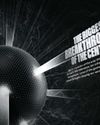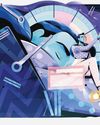
May I have your attention, please? I'll try and be quick, as I probably only have about 47 seconds before your mind starts wandering. That, according to psychologist Dr Gloria Mark, from the University of California, Irvine, is now our average attention span, based on her latest study of people's use of screens in the workplace.
When her team conducted a similar study back in 2004 (before anyone had a smartphone and there was no such thing as TikTok) we could focus for two and a half minutes before wanting to switch to something new.
Of course, these figures have their limits. Your declining concentration when grinding out a report may not mean your overall focus levels are collapsing.
After all, if you were sent a long message about some juicy gossip, you'd likely be able to give this your full focus for the required time.
As other psychologists have argued, your concentration can vary so much, that the very idea of an 'average' attention span is almost meaningless.
Because of this, there isn't even a scientific consensus on how to measure focus.
Nevertheless, it's likely you feel like yours is dwindling. As one recent survey from the Centre for Attention Studies at King's College London suggests, nearly half the population now feel as if theirs is worse than it was. With the ever-present pull of our emails (we check them 77 times a day, according to Mark's research) and social media (up to 237 times a day for some), it's easy to see why.
Of course, we can silence notifications, put on noise-cancelling headphones and work with applications that take up the full screen (tab clutter causes a significant drop in productivity, according to one 2021 study). Even when we've done all that, however, there's still the enemy within to contend with.
Denne historien er fra April 2024-utgaven av BBC Science Focus.
Start din 7-dagers gratis prøveperiode på Magzter GOLD for å få tilgang til tusenvis av utvalgte premiumhistorier og 9000+ magasiner og aviser.
Allerede abonnent ? Logg på
Denne historien er fra April 2024-utgaven av BBC Science Focus.
Start din 7-dagers gratis prøveperiode på Magzter GOLD for å få tilgang til tusenvis av utvalgte premiumhistorier og 9000+ magasiner og aviser.
Allerede abonnent? Logg på

THE WORST IDEAS OF THE 21ST CENTURY
NOT ALL IDEAS CAN BE HITS. ALONGSIDE GROUND-BREAKING INNOVATIONS, 21ST-CENTURY SCIENTISTS HAVE HELMED THEIR SHARE OF WILD TECH FLOPS, DUBIOUS THEORIES AND OVERHYPED BREAKTHROUGHS. HERE ARE THE BIGGEST TO FORGET

10 IDEAS THAT WILL SHAPE YOUR NEXT 25 YEARS
Predicting the future is considered a fool's game. But it's one many of us like to play.

THE BIGGEST BREAKTHROUGHS OF THE CENTURY
We're a quarter of the way into the new century. To mark this milestone, we asked the UK's top minds to highlight some of the game-changing scientific breakthroughs shaping our world since the year 2000

DO THE SCIENCE COGNITIVE SHUFFLE
Trouble sleeping? A lot on your mind? Use this trick and sedate your synapses

WHAT DETERMINES HOW MANY ABS I CAN GET?
Assuming you're a human being, you have exactly the same number of abs as everybody else: two.

HOW CAN I IDENTIFY MY PSYCHOLOGICAL BLIND SPOT?
In the 1950s two American psychologists, Joseph Luft and Harrington Ingham, proposed a way of thinking about psychological blind spots - things you don't know about yourself - that they called the 'Johari Window' (the term is a combination of their first names).

How can I change my personality?
Want to become more confident, extroverted or assertive? Science shows that with a few simple changes, you can unlock your best self

Could your cosmetics be harming your health?
Cosmetic companies are phasing out microplastics and so-called 'forever chemicals' to help protect consumers.

extraterrestrial US Congress is talking about activity again. Is the truth really out there?
Despite several testimonies, the question remains frustratingly unanswered

Map of 100 million human body cells revealed
Over three dozen new studies mark significant milestone towards complete Human Cell Atlas